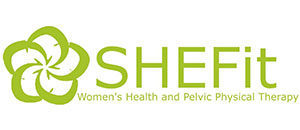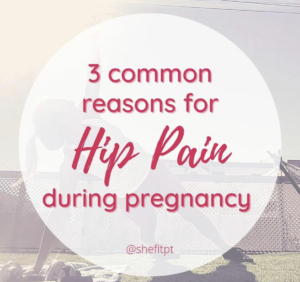3 Common Causes for Hip Pain During Pregnancy
by Dr. Sheri DeSchaaf, DPT
Hip pain is a common complaint during pregnancy. Many women try chiropractic, massage or acupuncture for this irritating problem, but unfortunately not many women are referred to physical therapy. This is shocking, because physical therapists treat hip pain in every other population from pediatrics to orthopedics, geriatrics and neurological disorders – so why don’t OBGYNs refer to PT??
Answer: because they simply aren’t trained to do so. But the good news is, if you haven’t tried PT for your hip pain, we can help! While all PTs treat hip pain, for pregnant women it is best to see a pregnancy and pelvic floor specialist. Our extensive post-doctoral education and experience working with the unique challenges of pregnancy make us the top experts for this issue. I have had clients tell me their orthopedic PT actually STOPPED treating them during pregnancy because they weren’t comfortable continuing, but most general PTs just don’t have the additional training and tools to relieve pregnancy related hip pain DESPITE the progressive body changes of pregnancy. And, they sometimes “don’t know what they don’t know” 😉 regarding the pelvic floor.
Enter: your highly specialized prenatal pelvic floor PT (us)!
In this article I am going to describe 3 common reasons for prenatal hip pain. This list is not exhaustive, and trust me figuring out what is causing YOUR specific pain is crucial in relieving it! That is the first piece of what we do in an individualized PT assessment. In my NEXT article I will divulge some great DIY tips for relieving hip pain, gathered from my own and my 3 amazing colleagues’ experience and training. Sign up for for my email list or follow me on Instagram to get that when it’s ready!
Cause #1: Changing Base of Support
Your base of support (BOS) is the area that forms the base under the trunk, connecting you to the ground – most often your feet (standing) or pelvis (sitting). As the size of your belly increases, its position over your base of support moves anterior (toward the front).
This changes the forces that go through the muscles, tendons and ligaments of your hips and pelvis, causing increased load and strain on your glutes, hip flexors, hamstrings, spinal muscles, etc.. The rapid change in load distribution (mass over base) can cause tension and irritation of the tendons and muscles, resulting in strain and pain.
Where you feel discomfort will depend on how YOUR body chooses to handle the added stress – it has multiple options and different bodies may choose different paths! Some better than others. 😉
As PTs, we specialize in helping you prepare for and adapt to these changes, as well as relieve the inevitable “growing pains” of pregnancy.
To get specific, expert help for your prenatal aches and pains, book a visit with one of our docs online or in person!
Cause #2: Inadequate hip and/or core strength
If you do not have adequate hip strength to adapt to your changing base of support and changing demand you will end up with more “wobble” (or waddle 😉) in your pelvis, especially with walking or running.
That excess wobble (lateral shift) causes excess friction between your tendons, IT band, hip bones, and a structure called your trochanteric bursa. Excess friction on the bursa over time will cause inflammation called bursitis.
If you feel sharp, hot, or pinpointed pain right over the bony part of your outer hip, it’s very likely you have bursitis! You will be most symptomatic with lying on your side, walking, standing on one leg (usually noticed when dressing or climbing stairs), or putting any pressure over the bursa.
Along with bursitis can come tendonitis of any of the tendons surrounding the hip joint.
Since physical therapy has existed we have been treating this type of hip pain! We reduce inflammation, bring in blood flow (can you say massaaaage?), promote healing, and build strength in a way that does not aggravate so that your pelvis can stabilize better and you can have a more comfortable remainder of your pregnancy (& life in general)!
In this case in particular, “waiting it out” is a BAD option. Reduced activity will simply make you weaker, and that doesn’t “just go away when baby comes”!
Cause #3: Nerve Irritation
Nerve pain during pregnancy is common.
One type of nerve pain is called “referred pain” – this is when the nerve is irritated, but the pain appears elsewhere. So the nerves in your back may be angry due to compression in the spine, but you feel the pain along the path of that nerve or somewhere that it travels. For the sciatic nerve this may be the back or side of your hip/buttock, and for the femoral nerves this could be the front of your hip, groin, or into your thigh.
Another type of nerve pain is “radiating pain”. This is that sharp stabbing pain down the leg along the path of the nerve. You may also feel burning, numbness, or tingling. Nerve pain in the hips is usually stemming from the lumbar or sacral nerve roots, or the peripheral nerves they form.
Why? Relaxin, muscle tension, changing posture, or even the position of baby’s body parts can compress OR traction the nerves, causing irritation as they leave the spine and travel to the legs. Pain from these nerves may be felt anywhere from the low back to the feet, including the hips, buttocks, and thighs (or even into the vulva!).
PT can help! Nerve pain can be fickle and tricky to treat – if you suspect this type of pain come see us right away for assessment and individualized treatment strategies including massage, exercises and specific stretches tailored for YOUR body.
Want to figure what is truly causing your pain and start to feel better? We’re here to help! ESPECIALLY if you have tried chiro, massage, and acupuncture and NOTHING is getting rid of your pain, it is time to see a prenatal pelvic floor PT. You can book a virtual or in-person appointment with one of our specialized and experienced doctors of PT here.
For more general education, stay tuned on Instagram AND check out my free online Proactive Pregnancy workshop at www.shefitpt.com/onlineworkshop!


